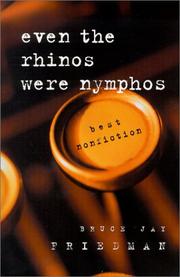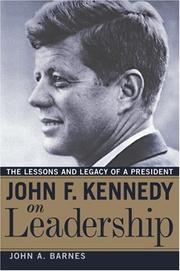| Listing 1 - 10 of 10 |
Sort by
|

ISBN: 0226289753 9780226289755 0226289737 9780226289731 0226289745 9780226289748 Year: 2017 Publisher: Chicago
Abstract | Keywords | Export | Availability | Bookmark
 Loading...
Loading...Choose an application
- Reference Manager
- EndNote
- RefWorks (Direct export to RefWorks)
The Sleep of Reason plunges us into a macabre world where good impulses bring on evil consequences-a world not unlike our own. In David Gewanter's alternately delightful and startling poems, allegory comes alive and stalks a bookstore's musty aisles, comedians eviscerate their families for a laugh, lovers love each other for withholding affection, and theaters collapse on audiences hungry for spectacle. Amidst such surreal subjects, Gewanter's delicate musicality and keen sense of humor sparkle; his inquisition regarding a fallen world becomes a dark comedy of errors haunted by the most unexpected characters-from JFK Jr. to Tacitus, Redd Foxx to General Motors, Mariah Carey to 100 rabbits with herpes. An offbeat satire for an off-kilter age, The Sleep of Reason offers an incisive guide to moral behavior in an immoral world.

ISBN: 022647576X 9780226475769 0226263509 9780226263502 Year: 2000 Publisher: Chicago
Abstract | Keywords | Export | Availability | Bookmark
 Loading...
Loading...Choose an application
- Reference Manager
- EndNote
- RefWorks (Direct export to RefWorks)
A few years ago, Christopher Buckley wrote of Bruce Jay Friedman in the New York Times Book Review that he "has been likened to everyone from J. D. Salinger to Woody Allen," but that "he is: Bruce Jay Friedman, sui generis, and no mean thing. No further comparisons are necessary." We are happy to report that he remains the same Bruce Jay Friedman in his unique, unblinking, and slightly tilted essays-collected here for the first time-in Even the Rhinos Were Nymphos. A butler school in Houston, a livestock auction in Little Rock, a home for "frozen guys" in California, JFK's humidor in Manhattan-all are jumping off points for Friedman's baleful and sharply satirical scrutiny of American life and behavior in the second half of the twentieth century. Travel with Friedman from Harlem to Hollywood, from Port-au-Prince to Etta's Eat Shop in Chicago. In these pieces, which were published in literary and mass-circulation magazines from the 1960s to the 1990s, you'll meet such luminaries as Castro and Clinton, Natalie Wood and Clint Eastwood, and even Friedman's friends Irwin Shaw, Nelson Algren, and Mario Puzo. Friedman is a master of the essay, whether the subject is crime reporting ("Lessons of the Street"), Hollywood shenanigans ("My Life among the Stars"), or his outrageous adventures as the editor of pulp magazines (the classic "Even the Rhinos Were Nymphos"). We could sing his praises as a journalist, humorist, and social critic. But, as Buckley tells us, being Bruce Jay Friedman is enough. Bruce Jay Friedman is the author of seven novels (including The Dick, Stern, and A Mother's Kisses), four collections of short stories, four full-length plays (including Scuba Duba and Steambath), and the screenplays for the movies Splash and Stir Crazy.
Authors, American --- American authors --- castro, clinton, natalie wood, clint eastwood, irwin shaw, nelson algren, mario puzo, crime, journalism, hollywood, celebrity, fame, pulp magazines, editor, houston, little rock, california, jfk, manhattan, satire, social commentary, american culture, nonfiction, history, politics, harlem, race, port au prince, chicago, essays, literature, media, humor.
Book
ISBN: 022641826X 022621124X 9780226211244 9780226211107 Year: 2015 Publisher: Chicago London
Abstract | Keywords | Export | Availability | Bookmark
 Loading...
Loading...Choose an application
- Reference Manager
- EndNote
- RefWorks (Direct export to RefWorks)
When Thomas Jefferson struck a deal for the Louisiana Purchase in 1803, he knew he was adding a new national power to those specified in the Constitution, but he also believed his actions were in the nation's best interest. His successors would follow his example, setting their own constitutional precedents. Tracing the evolution and expansion of the president's formal power, Untrodden Ground reveals the president to be the nation's most important law interpreter and examines how our commanders-in-chief have shaped the law through their responses to important issues of their time. Reviewing the processes taken by all forty-four presidents to form new legal precedents and the constitutional conventions that have developed as a result, Harold H. Bruff shows that the president is both more and less powerful than many suppose. He explores how presidents have been guided by both their predecessors' and their own interpretations of constitutional text, as well as how they implement policies in ways that statutes do not clearly authorize or forbid. But while executive power has expanded far beyond its original conception, Bruff argues that the modern presidency is appropriately limited by the national political process-their actions are legitimized by the assent of Congress and the American people or rejected through debilitating public outcry, judicial invalidation, reactive legislation, or impeachment. Synthesizing over two hundred years of presidential activity and conflict, this timely book casts new light on executive behavior and the American constitutional system.
Executive power --- Implied powers (Constitutional law) --- Presidents --- History. --- History. --- History. --- constitution, american, united states of america, usa, president, presidents, history, historical, government, governing, politicians, leaders, leadership, law, legal, interpretations, national power, nation state, presidential powers, executive branch, george washington, thomas jefferson, abraham lincoln, roosevelt, richard nixon, jfk, bush, barack obama, interpretation, understanding, supreme, founding document, separation, federal, authority, responsibility.
Book
ISBN: 0674259963 0674259971 Year: 2021 Publisher: Cambridge, Massachusetts : Harvard University Press,
Abstract | Keywords | Export | Availability | Bookmark
 Loading...
Loading...Choose an application
- Reference Manager
- EndNote
- RefWorks (Direct export to RefWorks)
"When Sorrow Comes explores the sermons that American clergy, primarily Protestant ministers, gave in the first weeks after national crises, beginning with Pearl Harbor. Additional chapters include the sermons given after the assassinations of John F. Kennedy and Martin Luther King Jr.; those given after the Oklahoma City bombing and the LA "Race Riots"; a chapter on the sermons given in the immediate aftermath of September 11, 2001; and a final chapter on the killing of Trayvon Martin and the Newtown School Shooting. The book focuses on three broad analytic questions: How do the sermons understand the tragedy and recommend that listeners process their grief? What assumptions inform the clergy's narratives of the relation between church and state during the crisis? What are the meanings ascribed to being both a Christian and a citizen during each emergency?"--
Church and state --- Topical preaching --- Religion and civil society --- Crisis management --- History --- Religious aspects --- Christianity. --- American political identity. --- Antigone. --- JFK assassination. --- MLK assassination. --- Newtown School Shooting. --- Oklahoma Bombing. --- Pearl Harbor. --- Rodney King uprising. --- Sermons. --- Trayvon Martin. --- church/state. --- civil society. --- mourning. --- preaching. --- pulpit.
Book
ISBN: 1283242249 9786613242242 0226326764 9780226326764 0226326780 9780226326788 9781283242240 9780226326771 0226326772 9780226326788 0226326780 Year: 2011 Publisher: Chicago
Abstract | Keywords | Export | Availability | Bookmark
 Loading...
Loading...Choose an application
- Reference Manager
- EndNote
- RefWorks (Direct export to RefWorks)
The rise of right-wing broadcasting during the Cold War has been mostly forgotten today. But in the 1950s and '60s you could turn on your radio any time of the day and listen to diatribes against communism, civil rights, the United Nations, fluoridation, federal income tax, Social Security, or JFK, as well as hosannas praising Barry Goldwater and Jesus Christ. Half a century before the rise of Rush Limbaugh and Glenn Beck, these broadcasters bucked the FCC's public interest mandate and created an alternate universe of right-wing political coverage, anticommunist sermons, and pro-business bluster. A lively look back at this formative era, What's Fair on the Air? charts the rise and fall of four of the most prominent right-wing broadcasters: H. L. Hunt, Dan Smoot, Carl McIntire, and Billy James Hargis. By the 1970s, all four had been hamstrung by the Internal Revenue Service, the FCC's Fairness Doctrine, and the rise of a more effective conservative movement. But before losing their battle for the airwaves, Heather Hendershot reveals, they purveyed ideological notions that would eventually triumph, creating a potent brew of religion, politics, and dedication to free-market economics that paved the way for the rise of Ronald Reagan, the Moral Majority, Fox News, and the Tea Party.
Right-wing extremists --- Radio in politics --- Mass media and propaganda --- Hunt, H. L. --- Hargis, Billy James, --- Smoot, Dan. --- McIntire, Carl, --- cold war, right wing, radio, news, broadcasting, public interest, communism, civil rights, united nations, fluoridation, political parties, income tax, social security, jfk, barry goldwater, jesus, religion, conservatism, hl hunt, dan smoot, republicans, carl mcintire, billy james hargis, fairness doctrine, fcc, irs, free market, ideology, talk show, hosts, mass media, propaganda, evangelism, extremism, business, reagan, moral majority, fox, tea party, nonfiction, journalism, politics, fundamentalism.
Book
ISBN: 1283362570 9786613362575 0226311309 9780226311302 6613362573 9780226311296 0226311295 9781283362573 Year: 2011 Publisher: Chicago, IL University of Chicago Press
Abstract | Keywords | Export | Availability | Bookmark
 Loading...
Loading...Choose an application
- Reference Manager
- EndNote
- RefWorks (Direct export to RefWorks)
Deliberation, in recent years, has emerged as a form of civic engagement worth reclaiming. In this persuasive book, Sandra M. Gustafson combines historical literary analysis and political theory in order to demonstrate that current democratic practices of deliberation are rooted in the civic rhetoric that flourished in the early American republic. Though the U.S. Constitution made deliberation central to republican self-governance, the ethical emphasis on group deliberation often conflicted with the rhetorical focus on persuasive speech. From Alexis de Tocqueville's ideas about the deliberative basis of American democracy through the works of Walt Whitman, John Dewey, John F. Kennedy, and Martin Luther King Jr., Gustafson shows how writers and speakers have made the aesthetic and political possibilities of deliberation central to their autobiographies, manifestos, novels, and orations. Examining seven key writers from the early American republic-including James Fenimore Cooper, David Crockett, and Daniel Webster-whose works of deliberative imagination explored the intersections of style and democratic substance, Gustafson offers a mode of historical and textual analysis that displays the wide range of resources imaginative language can contribute to political life.
Deliberative democracy --- United States --- Politics and government --- History --- democracy, politics, political science, american republic, united states of america, usa, history, historical, literature, literary, deliberation, civic engagement, constitution, self governance, government, governing, alexis de tocqueville, persuasive speech, walt whitman, fiction, poetry, nonfiction, creativity, john dewey, jfk, president kennedy, martin luther king jr, daniel webster, james fenimore cooper, david crockett, 19th century, republicanism, novel, protest, bunker hill.
Book
ISBN: 022631037X 9780226310374 9780226310060 9780226310237 022631006X 022631023X Year: 2016 Publisher: Chicago
Abstract | Keywords | Export | Availability | Bookmark
 Loading...
Loading...Choose an application
- Reference Manager
- EndNote
- RefWorks (Direct export to RefWorks)
Bloody, fiery spectacles-the Challenger disaster, 9/11, JFK's assassination-have given us moments of catastrophe that make it easy to answer the "where were you when" question and shape our ways of seeing what came before and after. Why are these spectacles so packed with meaning? In The Iconoclastic Imagination, Ned O'Gorman approaches each of these moments as an image of icon-destruction that give us distinct ways to imagine social existence in American life. He argues that the Cold War gave rise to crises in political, aesthetic, and political-aesthetic representations. Locating all of these crises within a "neoliberal imaginary," O'Gorman explains that since the Kennedy assassination, the most powerful way to see "America" has been in the destruction of representative American symbols or icons. This, in turn, has profound implications for a neoliberal economy, social philosophy, and public policy. Richly interwoven with philosophical, theological, and rhetorical traditions, the book offers a new foundation for a complex and innovative approach to studying Cold War America, political theory, and visual culture.
Social perception --- Neoliberalism --- Iconoclasm --- Disasters --- September 11 Terrorist Attacks, 2001 --- Public opinion. --- Public opinion. --- Kennedy, John F. --- Assassination --- Public opinion. --- Challenger (Spacecraft) --- Accidents --- Public opinion. --- economy, economics, wealth, america, american, united states, usa, kennedy, contemporary, modern, history, historical, 9/11, september 11, catastrophe, tragedy, iconoclast, imaginary, challenger, disaster, assassination, jfk, spectacle, social life, community, cold war, wartime, postwar, political, politics, aesthetic, symbols, icons, visual, public, neoliberal.

ISBN: 0814474551 0814408346 978081442869X 9786611128883 1621983684 1281128880 081442869X 9780814428696 9781621983682 9780814408346 9780814408346 Year: 2005 Publisher: New York AMACOM, American Management Association
Abstract | Keywords | Export | Availability | Bookmark
 Loading...
Loading...Choose an application
- Reference Manager
- EndNote
- RefWorks (Direct export to RefWorks)
Whether in business, politics, or the community, today's leaders have more in common with their legendary predecessors than they may realize. Intensely scrutinized by their constituents, colleagues, the media, and the public, leaders make decisions that affect lives far beyond their immediate surroundings.
Leadership. --- Engineering --- General and Others --- Leadership --- Communication in management --- Teams in the workplace --- Decision making --- Crisis management --- Kennedy, John F. --- Crises --- Management of crises --- Groups, Work --- Team building in the workplace --- Team work in the workplace --- Teambuilding in the workplace --- Teams, Work --- Teamwork in the workplace --- Work groups --- Work teams --- Management --- Kan-nai-ti, --- Gannaidi, --- Kanadī, Jūn Fītz Jīrāld, --- Kenedijs, Džons F., --- Kanīdī, Jūn F., --- Kenedi, Džon Fricdžerald, --- Kennedi, Dzhon Fit︠s︡dzherald, --- Kennedy, John Fitzgerald, --- Kennedy, Jack, --- Kennedy, Ken, --- Kʻenedi, --- Kenedi, Dzhon F., --- JFK --- Ḳenedi, G'on F., --- Кеннеди, Джон Ф. --- كنيدى، جون فيتزجيرالد،, --- كنيدى، جون ف.،, --- كيندي، جون ف., --- کندى، جان --- .كندى، جون ف ،, --- קנדי, ג'ון פ. --- Problem solving --- Conflict management --- Social groups --- Work environment --- J. F. K. --- Kindī, Jān If., --- Kinidī, Jān If., --- کندى، جان اف. --- Kennedy, John Fitzgerald
Book
ISBN: 3030157962 3030157954 Year: 2019 Publisher: Cham : Springer International Publishing : Imprint: Palgrave Macmillan,
Abstract | Keywords | Export | Availability | Bookmark
 Loading...
Loading...Choose an application
- Reference Manager
- EndNote
- RefWorks (Direct export to RefWorks)
Of the hundreds of books written about John F. Kennedy, none have yet taken the full measure of the role that Theodore Sorensen played in shaping his presidency. Serving as President Kennedy’s speechwriter from 1952 until 1963, Sorensen was a key advisor in the White House and a gatekeeper of the Kennedy legacy in the years after his assassination. This book presents a compelling portrait of Sorensen’s life and place in the American political landscape. He became an outspoken critic of corruption in politics, a vocal opponent of the militarist foreign policy approach that successive administrations adopted, and an advisor to Democratic presidential candidates such as Robert F. Kennedy and Barack Obama. Taking up questions about the role of presidential advisors and the concept of public service, an ideal that was central to the most famous of the speeches that Sorensen wrote for President Kennedy, Michelle A. Ulyatt offers new insight into Sorensen’s influence on the Kennedy years and the generation of leaders who came after.
Kennedy, John F. --- Kan-nai-ti, --- Gannaidi, --- Kanadī, Jūn Fītz Jīrāld, --- Kenedijs, Džons F., --- Kanīdī, Jūn F., --- Kenedi, Džon Fricdžerald, --- Kennedi, Dzhon Fit︠s︡dzherald, --- Kennedy, John Fitzgerald, --- Kennedy, Jack, --- Kennedy, Ken, --- Kʻenedi, --- Kenedi, Dzhon F., --- JFK --- Ḳenedi, G'on F., --- Кеннеди, Джон Ф. --- كنيدى، جون فيتزجيرالد،, --- كنيدى، جون ف.،, --- كيندي، جون ف., --- کندى، جان --- .كندى، جون ف ،, --- קנדי, ג'ון פ. --- United States-History. --- World politics. --- International relations. --- US History. --- Political History. --- Foreign Policy. --- Coexistence --- Foreign affairs --- Foreign policy --- Foreign relations --- Global governance --- Interdependence of nations --- International affairs --- Peaceful coexistence --- World order --- National security --- Sovereignty --- World politics --- Colonialism --- Global politics --- International politics --- Political history --- Political science --- World history --- Eastern question --- Geopolitics --- International organization --- International relations --- United States—History. --- United States --- History.

ISBN: 0520940407 1598755862 9780520940406 1423717309 9781423717300 9780520239487 0520239482 9781598755862 Year: 2005 Publisher: Berkeley University of California Press
Abstract | Keywords | Export | Availability | Bookmark
 Loading...
Loading...Choose an application
- Reference Manager
- EndNote
- RefWorks (Direct export to RefWorks)
Perils of Dominance is the first completely new interpretation of how and why the United States went to war in Vietnam. It provides an authoritative challenge to the prevailing explanation that U.S. officials adhered blindly to a Cold War doctrine that loss of Vietnam would cause a "domino effect" leading to communist domination of the area. Gareth Porter presents compelling evidence that U.S. policy decisions on Vietnam from 1954 to mid-1965 were shaped by an overwhelming imbalance of military power favoring the United States over the Soviet Union and China. He demonstrates how the slide into war in Vietnam is relevant to understanding why the United States went to war in Iraq, and why such wars are likely as long as U.S. military power is overwhelmingly dominant in the world. Challenging conventional wisdom about the origins of the war, Porter argues that the main impetus for military intervention in Vietnam came not from presidents Kennedy and Johnson but from high-ranking national security officials in their administrations who were heavily influenced by U.S. dominance over its Cold War foes. Porter argues that presidents Eisenhower, Kennedy, and Johnson were all strongly opposed to sending combat forces to Vietnam, but that both Kennedy and Johnson were strongly pressured by their national security advisers to undertake military intervention. Porter reveals for the first time that Kennedy attempted to open a diplomatic track for peace negotiations with North Vietnam in 1962 but was frustrated by bureaucratic resistance. Significantly revising the historical account of a major turning point, Porter describes how Secretary of Defense Robert McNamara deliberately misled Johnson in the Gulf of Tonkin crisis, effectively taking the decision to bomb North Vietnam out of the president's hands.
Balance of power --- National security --- Vietnam War, 1961-1975 --- Power, Balance of --- Power politics --- International relations --- Political realism --- History --- Diplomatic history. --- Kennedy, John F. --- Johnson, Lyndon B. --- Chan-sên, --- Johnson, Lyndon Baines, --- Dzhonson, Lindon, --- L. B. J. --- ג'ונסון, לינדון --- ジョンソン, --- Johnson, L. --- Čhō̜nsan, Lindō̜n Bī., --- Kennedy, John Fitzgerald --- United States --- Vietnam --- ABŞ --- ABSh --- Ameerika Ühendriigid --- America (Republic) --- Amerika Birlăshmish Shtatlary --- Amerika Birlăşmi Ştatları --- Amerika Birlăşmiş Ştatları --- Amerika ka Kelenyalen Jamanaw --- Amerika Qūrama Shtattary --- Amerika Qŭshma Shtatlari --- Amerika Qushma Shtattary --- Amerika (Republic) --- Amerikai Egyesült Államok --- Amerikanʹ Veĭtʹsėndi︠a︡vks Shtattnė --- Amerikări Pĕrleshu̇llĕ Shtatsem --- Amerikas Forenede Stater --- Amerikayi Miatsʻyal Nahangner --- Ameriketako Estatu Batuak --- Amirika Carékat --- AQSh --- Ar. ha-B. --- Arhab --- Artsot ha-Berit --- Artzois Ha'bris --- Bí-kok --- Ē.P.A. --- EE.UU. --- Egyesült Államok --- ĒPA --- Estados Unidos --- Estados Unidos da América do Norte --- Estados Unidos de América --- Estaos Xuníos --- Estaos Xuníos d'América --- Estatos Unitos --- Estatos Unitos d'America --- Estats Units d'Amèrica --- Ètats-Unis d'Amèrica --- États-Unis d'Amérique --- Fareyniḳṭe Shṭaṭn --- Feriene Steaten --- Feriene Steaten fan Amearika --- Forente stater --- FS --- Hēnomenai Politeiai Amerikēs --- Hēnōmenes Politeies tēs Amerikēs --- Hiwsisayin Amerikayi Miatsʻeal Tērutʻiwnkʻ --- Istadus Unidus --- Jungtinės Amerikos valstybės --- Mei guo --- Mei-kuo --- Meiguo --- Mî-koet --- Miatsʻyal Nahangner --- Miguk --- Na Stàitean Aonaichte --- NSA --- S.U.A. --- SAD --- Saharat ʻAmērikā --- SASht --- Severo-Amerikanskie Shtaty --- Severo-Amerikanskie Soedinennye Shtaty --- Si︠e︡vero-Amerikanskīe Soedinennye Shtaty --- Sjedinjene Američke Države --- Soedinennye Shtaty Ameriki --- Soedinennye Shtaty Severnoĭ Ameriki --- Soedinennye Shtaty Si︠e︡vernoĭ Ameriki --- Spojené staty americké --- SShA --- Stadoù-Unanet Amerika --- Stáit Aontaithe Mheiriceá --- Stany Zjednoczone --- Stati Uniti --- Stati Uniti d'America --- Stâts Unîts --- Stâts Unîts di Americhe --- Steatyn Unnaneysit --- Steatyn Unnaneysit America --- SUA (Stati Uniti d'America) --- Sŭedineni amerikanski shtati --- Sŭedinenite shtati --- Tetã peteĩ reko Amérikagua --- U.S. --- U.S.A. --- United States of America --- Unol Daleithiau --- Unol Daleithiau America --- Unuiĝintaj Ŝtatoj de Ameriko --- US --- USA --- Usono --- Vaeinigte Staatn --- Vaeinigte Staatn vo Amerika --- Vereinigte Staaten --- Vereinigte Staaten von Amerika --- Verenigde State van Amerika --- Verenigde Staten --- VS --- VSA --- Wááshindoon Bikéyah Ałhidadiidzooígíí --- Wilāyāt al-Muttaḥidah --- Wilāyāt al-Muttaḥidah al-Amirīkīyah --- Wilāyāt al-Muttaḥidah al-Amrīkīyah --- Yhdysvallat --- Yunaeted Stet --- Yunaeted Stet blong Amerika --- ZDA --- Združene države Amerike --- Zʹi︠e︡dnani Derz︠h︡avy Ameryky --- Zjadnośone staty Ameriki --- Zluchanyi︠a︡ Shtaty Ameryki --- Zlucheni Derz︠h︡avy --- ZSA --- Η.Π.Α. --- Ηνωμένες Πολιτείες της Αμερικής --- Америка (Republic) --- Американь Вейтьсэндявкс Штаттнэ --- Америкӑри Пӗрлешӳллӗ Штатсем --- САЩ --- Съединените щати --- Злучаныя Штаты Амерыкі --- ولايات المتحدة --- ولايات المتّحدة الأمريكيّة --- ولايات المتحدة الامريكية --- 미국 --- Foreign relations --- Decision making. --- Spojené obce severoamerické --- Geografie --- Sociale geografie --- Politieke Geografie. --- États-Unis --- É.-U. --- ÉU --- 20th century american history. --- 20th century american military history. --- american history. --- american military history. --- cold war doctrine. --- cold war. --- communism. --- communist domination. --- domino effect. --- gulf of tonkin. --- historical. --- jfk. --- lbj. --- military intervention. --- military power. --- national security officials. --- national security. --- north vietnam. --- peace negotiations. --- political. --- politics. --- president john f kennedy. --- president lyndon b johnson. --- secretary of defense. --- united states of america. --- us foreign policy. --- us policy. --- vietnam war. --- warfare.
| Listing 1 - 10 of 10 |
Sort by
|

 Search
Search Feedback
Feedback About UniCat
About UniCat  Help
Help News
News